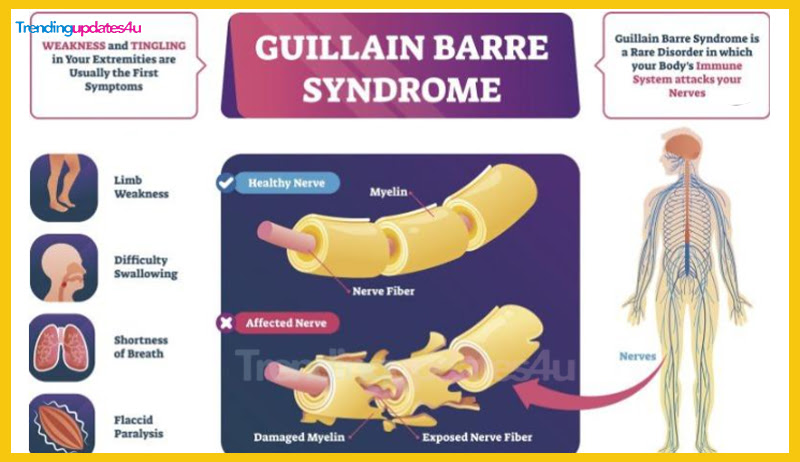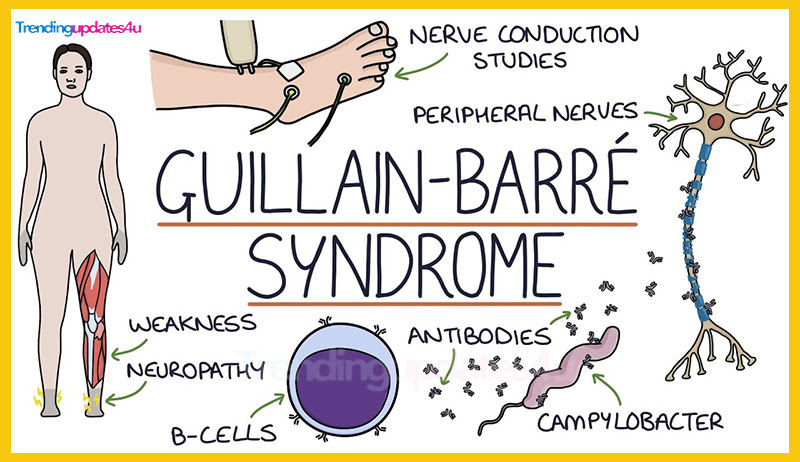Guillain-Barré Syndrome (GBS):- Guillain-Barré Syndrome (GBS) is a rare but serious neurological condition that affects the peripheral nerves. These nerves play a vital role in controlling muscle movement, transmitting pain signals, and managing sensory functions like touch and temperature. This article explores the causes, symptoms, complications, and treatment options for GBS, tailored for the Indian audience.
Guillain-Barré Syndrome
Guillain-Barré Syndrome (GBS) is a rare neurological disorder in which the body’s immune system mistakenly attacks the peripheral nerves, leading to muscle weakness, tingling sensations, and, in severe cases, paralysis. This condition often develops as a post-infectious complication, typically occurring one to six weeks after a bacterial or viral infection, such as Campylobacter jejuni, influenza, or Zika virus.

While the exact cause remains unclear, GBS is considered an immune-mediated neuropathy, meaning the immune system damages the protective covering (myelin) of the nerves, disrupting their ability to transmit signals efficiently. The symptoms of GBS can progress rapidly, with most individuals experiencing their peak weakness within two to three weeks. Early diagnosis and treatment, such as immunotherapy (IVIG or plasma exchange) and supportive care, are crucial in managing the condition. Though recovery can take weeks to months, most individuals recover fully with timely intervention.
Guillain-Barré Syndrome Details
| Aspect | Details |
| Article for | Guillain-Barré Syndrome (GBS): Causes, Symptoms, and Treatment |
| What is GBS? | A rare autoimmune disorder where the immune system attacks the peripheral nerves, causing muscle weakness and nerve damage. |
| Key Symptoms | – Tingling sensations (paresthesia) in feet and legs. – Muscle weakness spreading to arms and face. – Difficulty breathing, speaking, or swallowing. – Paralysis in severe cases. |
| Who is at Risk? | – People recovering from respiratory or gastrointestinal infections. – Very rare post-vaccination cases. |
| Category | Health |
| Diagnosis | – Clinical evaluation of symptoms. – Nerve conduction studies. – Lumbar puncture (cerebrospinal fluid analysis). |
What is Guillain-Barré Syndrome (GBS)?
Guillain-Barré Syndrome is an autoimmune disorder in which the immune system mistakenly attacks the peripheral nerves, leading to nerve damage. While the condition is not chronic, it often requires prompt medical attention as it can progress rapidly.

Symptoms of Guillain-Barré Syndrome
The symptoms of GBS can vary in severity and typically begin with muscle weakness and tingling sensations (paresthesia). Here’s a detailed breakdown of the common symptoms:
- Early Symptoms:
- Muscle weakness and tingling, often starting in the feet and legs.
- Sensations spreading upwards to the arms and face.
- Progressive Symptoms:
- Deep muscular pain, especially in the back and legs.
- Paralysis of legs, arms, or facial muscles.
- Weakness in chest muscles, making breathing difficult (affects about 1 in 3 people).
- Difficulty speaking, swallowing, or moving the eyes.
- Severe Cases:
- Total or near-total paralysis within weeks of symptom onset.
- Vision problems.
If you or someone you know experiences sudden muscle weakness or difficulty breathing, seek medical attention immediately. Early intervention is crucial.
Complications of Guillain-Barré Syndrome
GBS can lead to serious complications if it affects the autonomic nerves, which regulate vital functions like heart rate, blood pressure, and digestion. Complications may include:
- Cardiac Issues: Irregular heartbeats (arrhythmias).
- Blood Pressure Problems: Unstable or fluctuating blood pressure levels.
- Gastrointestinal and Bladder Issues: Difficulty in digestion or urinary retention.
These complications highlight the importance of early and effective medical care.
Causes of Guillain-Barré Syndrome
The exact cause of GBS is not fully understood, but it is often triggered by an abnormal immune response following an infection or other immune system-related factors.
- Post-Infectious Development:
- In 70% of cases, symptoms appear 1–6 weeks after an infection.
- Common triggers include respiratory or gastrointestinal infections.
- Common Triggers:
- Bacterial Infections: Campylobacter jejuni (causing diarrhea).
- Viral Infections: Influenza, Epstein-Barr virus, Zika virus, and cytomegalovirus.
- Vaccines: Rarely, GBS can develop after vaccination, but the risk is minimal compared to the benefits of vaccination.
- Surgery: Very rarely, surgery can trigger GBS.
Understanding these triggers can help in early diagnosis and prevention strategies.
Diagnosis and Treatment of Guillain-Barré Syndrome
Diagnosis:
GBS is diagnosed through a combination of clinical symptoms and diagnostic tests, including:
- Nerve conduction studies.
- Lumbar puncture to check cerebrospinal fluid.
Treatment:
There’s no specific cure for GBS, but treatments can manage symptoms and improve recovery.
- Immunotherapy: Intravenous immunoglobulin (IVIG) or plasma exchange (plasmapheresis) to reduce immune system attack on nerves.
- Supportive Care: Breathing support for severe cases and physical therapy for muscle strength recovery.
Most people begin to recover within weeks or months, but recovery time can vary.
Living with Guillain-Barré Syndrome
Recovery from GBS is a gradual process. Rehabilitation involving physical therapy and counseling plays a crucial role in regaining muscle strength and coping with emotional challenges.
Key Tips for Recovery:
- Maintain a healthy diet to support nerve repair.
- Stay active with gentle exercises as recommended by your healthcare provider.
- Join support groups to connect with others who have experienced GBS.
When to Seek Medical Attention?
If you experience sudden muscle weakness, difficulty breathing, or any symptoms worsening over hours or days, consult a healthcare provider immediately. Early diagnosis and treatment are critical for better outcomes.
Conclusion
Guillain-Barré Syndrome is a rare but treatable condition if diagnosed early. Understanding its symptoms, causes, and complications can help in timely medical intervention. If you or someone you know is experiencing symptoms of GBS, seek professional medical care promptly.
By spreading awareness about GBS, we can ensure better outcomes and support for those affected.
FAQ’s
What is Guillain-Barré Syndrome (GBS)?
Guillain-Barré Syndrome is a rare autoimmune disorder where the immune system attacks the peripheral nerves, leading to muscle weakness, tingling sensations, and sometimes paralysis.
What are the early symptoms of Guillain-Barré Syndrome?
The first signs of GBS often include:
- Tingling sensations in the feet and legs.
- Muscle weakness that starts in the lower body and progresses upward.
- Difficulty walking or climbing stairs.
What causes Guillain-Barré Syndrome?
GBS typically occurs after an infection, such as:
- Campylobacter jejuni (a bacterial infection causing diarrhea).
- Viral infections like influenza, Zika virus, or Epstein-Barr virus.
- Rarely, GBS may develop after surgery or vaccination.
Is Guillain-Barré Syndrome life-threatening?
While rare, GBS can become life-threatening if it affects the respiratory muscles or autonomic nerves. Prompt medical attention and treatment are essential to prevent severe complications.
How long does it take to recover from Guillain-Barré Syndrome?
Recovery time varies, ranging from weeks to months. While most people recover fully, some may experience lingering weakness or nerve damage.
How is Guillain-Barré Syndrome treated?
Treatment options include:
- Immunotherapy: Intravenous Immunoglobulin (IVIG) or Plasma Exchange to reduce the immune attack on nerves.
- Supportive care: Breathing support, pain management, and physical therapy for rehabilitation.
Related Posts:-